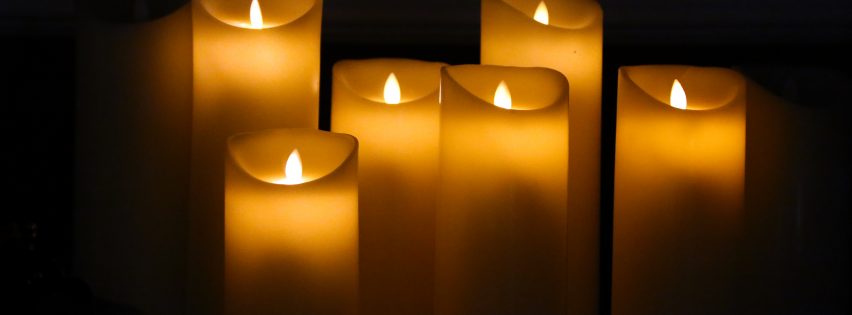Candles in the Home

Most people will accept a naked flame in their homes for very specific reasons. Boilers, fireplaces, gas hobs and ovens, cigarette lighters and of course, candles. Our boilers, ovens, log burners and gas fires are rightly treated with caution. The products, installation and servicing are legislated, regulated and monitored. The risk of lighters and matches, the need to keep them from children and the risk of fire is well known and often discussed. But while many homeowners, landlords and residents would never dream of exposing themselves to the risk of a poorly maintained boiler, and habitually keep all flammable materials away from fireplaces and hobs, there is often far less caution displayed with candles.
The popularity of candles has risen in recent years, particularly scented candles, oil burners and the like. Small votive candles and tea light arrangements are also popular. Unfortunately, as more and more people bring open flames into their homes, the risk of those flames becoming fires also increases. There are other products that will scent a room just fine without being a fire risk but there is no reason to overreact. There are things you can do to make sure tenants are using candles safely and there are definitely things to avoid.
WHAT NOT TO DO WITH CANDLES
Do not place candles under, above or near anything flammable; particularly curtains, bedding, rugs, carpets, cushions, paperwork, posters, paintings, etc. Candles radiate heat considerably further than the flame itself, so avoid areas where paintings, prints or posters are on the wall.
Do not place candles on windowsills. All it takes is a breeze, the snap of a curtain ring or the nudging of a curtain to start a fire.
Avoid placing candles on surfaces near doorways. In these places there is a greater chance of them being knocked or bumped, which can easily lead to a fire.
Do not place candles above a heat source, particularly scented ones in glass holders. Radiators, fire places, microwave ovens, even televisions. Scented candles can have low melting points to release the scent and even a modest heat source can cause melting at the bottom of the candle. Candle wax expands considerably when heated, which can put pressure on the glass container which, if flawed, chipped or cracked, can explode.
Do not place candles on or near electronics. You do not want heat, smoke or wax in your television, computer, or games console.
Do not place candles on the floor. Candles arranged on the floor in a romantic display are a Hollywood staple, but not something to be replicated at home. Not only is there danger of one or more of the candles being knocked over, but tea lights and glass holders can get extremely hot when the candles are lit. Carpets, rugs, even wooden or laminate floors can become burned or catch fire.
Do not place candles directly on the rim of a bath. Most modern baths are fibreglass / acrylic and these can be scorched, melted or even burned by the heat of the candle holder. Towels, toilet paper, dressing gowns, bath mats and the like are also highly flammable.
Do not place candles under wall mounted televisions. Not only can the heat and smoke rise into the vents, potentially setting your television on fire, but every time you extinguish a candle, or it improperly burns, the vaporised gaseous wax can rise through the vents, potentially building up in the components of your television, which, over time could lead to a fire.
Never, ever, leave a candle burning unattended. This goes double if you have pets, children or a particularly clumsy partner.
WHAT TO DO WITH CANDLES
Respect the fire. Remember that candles are naked flames and treat them with the respect you would any other fire. They get hotter than you think.
Ensure candles, especially tea lights, are in suitable holders which insulate the surroundings from the heat.
Never pick up a candle while it is lit, while the wax is still liquid, not only could you give yourself a nasty burn, but that may be the least of your concerns if you drop the candle.
Do not mix Candles and Alcohol. Candles and wine are a classic, romantic and relaxing combination. But, if you wouldn’t be allowed to drive a car, it’s probably best not to be in charge of something that can burn your house down if you bump into it.
Put candles out completely, preferably with a lid or snuffer. If the wick is still glowing or hot, the candle can still reignite, starving the candle of oxygen entirely is much safer.




